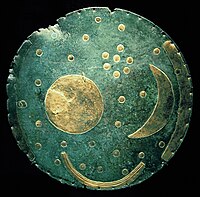16th century BC c.
Contenido keyboard_arrow_down
The 16th century B.C. C. began on January 1, 1600 B.C. C. and ended on January 1, 1501 a. c.
Events
- 1600 BC: in China the Shang dynasty is instituted.
- 1600 to 1300 B.C.: In Central Europe — from the Rhine River to the Western Carpathians, and from the Alps to the Baltic Sea — the tumulus culture begins, so called by the individual inhumation graves with earth mounds. Three centuries later it will be replaced by the culture of the urn fields.
- 1600 B.C.: on the banks of the Unstrut river, in Nebra (Sajonia-Anhalt, in current Germany), artisans of Unetice culture create a star disk. It was made public in 2002, when people who had found it in 1999 wanted to sell it and were arrested.
- 1600 B.C.: In southern Mexico the Olmeca culture begins.
- 1600 BC: At the Aegean Sea ends the civilization of the Cyclades Islands.
- 1600-1200 B.C.: In Anatolia (present-day Turkey) the Hittite make iron tools and weapons.
- 1600-1200 BC: In ancient Greece, the village Tirinto begins to be inhabited.
- 1600 BC: near the current Bogazköy, about 250 km south of the Black Sea (in Turkey), the Hittites establish their capital in Hattusa.
- 1595 B.C.: in Mesopotamia, the houses finally take the city of Babylon.
- 1566 B.C.: In Jericho (Israel) an earthquake of X degrees occurs in the seismological scale of Mercalli (from I to XII). The amount of dead is unknown.
- 1554 B.C.: In Egypt, a scribe of the Middle Empire writes a papyrus about employment as a medicinal plant of the species Maritime caribdis for the treatment of edemas.
- 1550 B.C.: the country of Egypt expands to the land of Canaan.
- 1550 to 1500 BC: in the acropolis of Micenas (Greece), one or more goldsmiths perform a funeral mask. In 1876 it was found by the German millionaire Heinrich Schliemann (1822-1890) who mistakenly believed that he had belonged to King Agamemnon (sixteenth century)XIII). It is currently in the National Archaeological Museum of Athens.
- 1545: According to the high chronology, in Egypt dies Ahmose I, Pharaoh and founder of the eighteenth dynasty.
- 1525 B.C.: In Hattusa begins to rule Telepinu, king of the Hittites. It will publish Proclamation of Telepinu.
- 1525 B.C.: In ancient Egypt the 15th Dynasty disappears.
- 1522 B.C.: According to the Hebrew calendar, the Hebrew patriarch Jacob emigrates to Egypt, settling on the Land of Goshen.
- 1521 B.C. (24 April): Moon saros begin 36.
- 1513 B.C.: According to the congregation of the Jehovah's Witnesses, this year the Jewish exodus of Egypt came to "the land promised" by the Lord God.
- 1511 BC: according to Paros Chronicle, in Athens begins to reign Erictonio.
- 1510 B.C.: In ancient Egypt, among the treasures that are lega to the dead in the graves, mercury is beginning to be left.
- 1506 BC: according to Paros Chronicle in ancient Athens begins the reign of Erictonio.
- 1506 a. C.: Cécrope I, legendary king of Athens, dies after a 50-year reign. Having survived his own son, it was succeeded by Cránao.
- h. 1506 B.C.: Tutmosis I (Egyptian 18th Dynasty) begins to govern. Alternatively, a date from 1504 to C. is also possible.
- 1500 B.C.: Egypt conquers Nubia and the Levant (1504 B.C.–1492 B.C.).
- 1500 B.C.: the kushita kings conquer Kemet (the ancient Egypt).
- 1500 B.C.: in Hattusa (Turkey center) the Hittite King Telepinu dies.
- 1500 B.C.: In ancient Greece begins micenic civilization.
- In Pakistan the composition begins—orally, as until then in Asia only the Sumerians had invented the writing—of the Rig-veda (the oldest text in India). The text will be set several centuries later.
- The nomadic Aryan people—whose language has ceased to be the indoiranio (an indo-European language) and has become Sanskrit— begin to invade India from Pakistan, possibly non-violent.
- In the region of current Jordan, the Ammonite people began to develop.
- The oldest remains of domesticated ferret date back to this time.
- Celts appear in Europe, speaking of an Indo-European language from Ukraine.
- In Europe the ox begins to domesticate.
- In ancient Greece begins the celebration of the eleusin mysteries—a ritual of initiation, possibly with bread and wine contaminated with the cornezuelo fungus of the rye.
- Polynesians settle in the Fiyi Islands.
Relevant people
- Puzur-Assur III, king of Assyria.
- Amosis I, Pharaoh of Egypt.
- Telepinu, king of the Hittites.
Contenido relacionado
Josep Puig i Cadafalch
Bogota
History of medicine
Más resultados...
